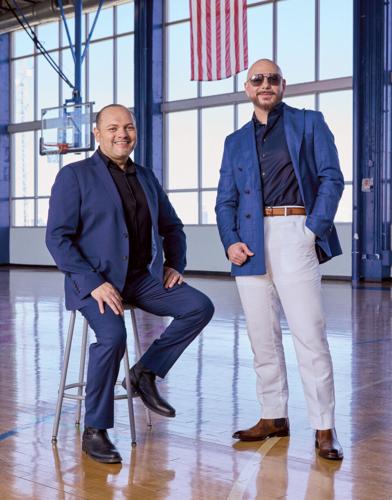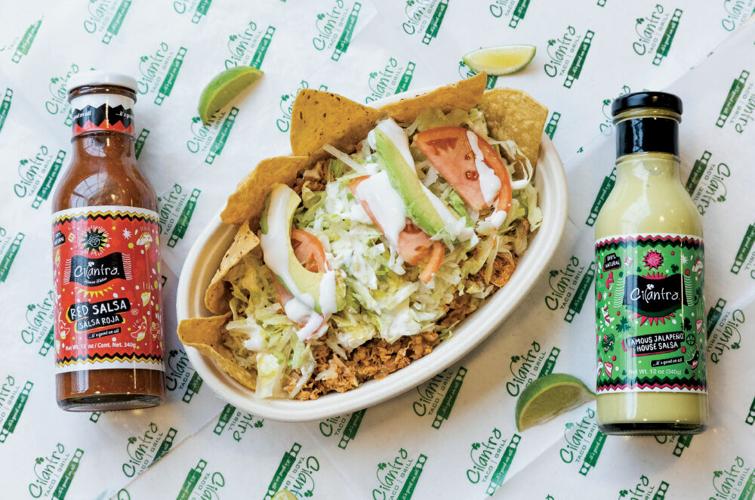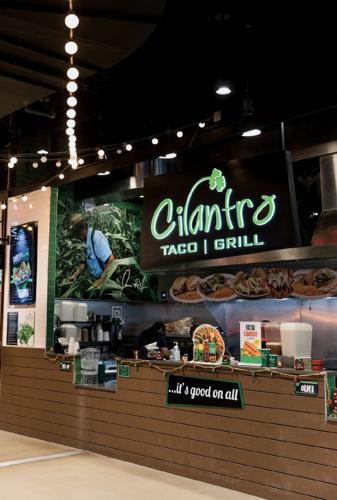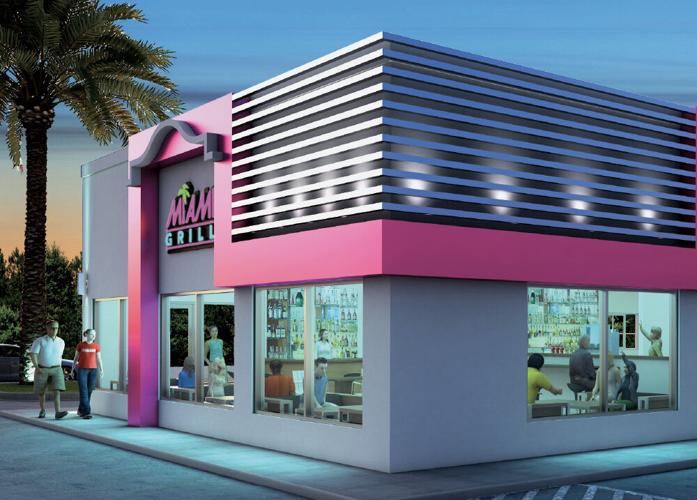
Cilantro Taco Grill founder Temoc Morfin, left, impressed Pitbull with his investment pitch prior to one of the rapper’s concerts and the two are now working to grow the Chicago-based franchise.
Pitbull—also known as Mr. Worldwide and Mr. 305 (Miami's area code)—is back with another franchise investment, this time putting his money and personality behind Chicago-based Cilantro Taco Grill through a partnership with Fransmart. In the midst of his Trilogy Tour with Ricky Martin and Enrique Iglesias, the rapper discusses his admiration for Cilantro founder and fellow Latino Temoc Morfin, his love of the food and their shared belief in the brand's ability to scale.
In between photo shoot setups, it’s tequila shots for Pitbull and Temoc Morfin. Speaking in their native Spanish and laughing together over jokes, the connection between the superstar entertainer and the owner of the restaurant concept he’s backing is real and extends beyond business.
“What really made me fall in love with the opportunity and with them as human beings is the story,” said Pitbull as he settled in for an interview at SLAM, a public charter school he funds in the Little Havana neighborhood of Miami. “If we relate to each other’s stories, then that means we will always find ways to create solutions in the business.”
Pitbull, the stage name for Armando Christian Perez, invested with franchise development firm Fransmart in Cilantro Taco Grill, which Morfin founded in Chicago. The brand started franchising last year and has 16 corporate stores open with another two in the works. It signed its first franchisee and has more agreements in the works, including for the development rights in Florida.
Donning a vibrant blue sport jacket with windowpane checks—which Perez noted he got on sale—paired with cream-colored pants and aviator sunglasses, he’s the epitome of Miami, a city whose area code is another of his monikers, Mr. 305, and the name of his record label. When he entered the gym at SLAM Miami, he greeted everyone with a hug or a kiss on the cheek, and he introduced himself despite needing no introduction. He has a swagger about him that lets you know, yes, he’s famous rapper Pitbull, but he’s devoid of arrogance. (When he learned Franchise Times is based in Minneapolis, he jokingly responded, “You’re welcome,” for the much nicer South Florida weather.)
For much of the interview, Perez spoke passionately of his own “American dream” accomplishments and the responsibility he feels to help others achieve theirs.
His family emigrated from Cuba to Miami and he’s the first to be born in the United States—something his parents told him was a blessing. “They always emphasized the fact of in this country, you can be anything that you want to be, as long as you work hard for it,” the 43-year-old said.
And Perez does work hard. He’s put out a dozen albums since 2004 and toured with big names including Britney Spears, Iggy Azalea and Kesha. In late February, he was in the midst of The Trilogy Tour, co-headlined with fellow Latin stars Enrique Iglesias and Ricky Martin.
“Performing live, for me, is the ultimate high,” he said. “It’s the ultimate confirmation that what you’re doing works.”
He loves providing his fans with a distraction from the real world for an hour or two. “That’s priceless. That’s why I love to be on the road,” he said.

Cilantro Taco Grill serves authentic Mexican dishes in a Chipotle-esque, line-style format so customers can choose their toppings.
Unafraid to set big goals
Temoc Morfin immigrated to the United States from Guadalajara, Mexico, when he was 10 years old. His parents brought him and his 10 siblings to Los Angeles and later Chicago. “My older brothers and sisters, they understood a little more. For me, it was a trip. It was an adventure,” Morfin said.
After a stint in politics (Morfin was the first to go to college, where he studied political science, against his father’s advice), Morfin launched Cilantro Taco Grill in 2013. He set a goal for all of his family members to have a piece of the Cilantro pie by owning their own store. “It was quite a journey because there is 11 of us,” Morfin said. But he persisted. His next goal was franchising.
With an emphasis on authenticity, the chain serves a variety of proteins local to Mexico, such as lengua (beef tongue), cabeza (beef head) and cecina (thin salted steak). Those items are joined on the menu by more mainstream offerings such as steak and chicken tacos, burritos, tortas and tamales.
“The food is amazing,” Perez said. “It’s like if you were to go to someone’s house and have authentic Mexican food.”
Morfin’s father instilled in him a deep business drive after, as a child, Morfin saw his dad often juggling multiple jobs. Starting Cilantro met a goal his father set for him. “The greatest satisfaction for me is his words before passing away. He said, ‘Son, I’m really proud of you.’ He said, ‘I know you would do well,’” said Morfin as emotion showed in his voice.
Soon after Fransmart took an ownership stake in Cilantro last year, the firm’s CEO, Dan Rowe, told Morfin a celebrity named Armando Perez was interested in investing. Little did he know, that was Pitbull’s real name. “I grew up with Pitbull’s music, but I never knew his real name. … One of my sisters said, ‘Dummy, that’s Pitbull,’” Morfin said.
Rowe recalled Perez asking why most Latin brands are owned and ran by white people, rather than Latinos. “I don’t know why no one has ever actually grown a real, authentic Latin brand,” Rowe said. The two formed a partnership through which they’re looking to support and expand Latino-owned companies, the first being Cilantro.
All Morfin had to do, Rowe said, was sell Perez on his Cilantro pitch prior to a concert in Phoenix. “I gotta be real, I was nervous,” Morfin said. Upon meeting Perez, Morfin shared his story of coming to the United States, pursuing education and founding Cilantro later in his life.

The Cilantro Taco Grill corporate team has faith in Fransmart to grow the brand to 1,000 restaurants in the next decade. From left, Hernan Morfin, chief technology officer; Aaron Morfin, chief marketing officer; Gerardo Morfin, chief operating officer; and Temoc Morfin, founder and chief executive officer.
“He gets up, he shakes my hand, he’s like, ‘This is exactly what I’m looking for. You really touched me with your story and the search for the American dream,’” said Morfin, who added he’s since gone to a number of Pitbull shows. “He’s probably like, ugh, these guys again,” he joked.
Perez said he appreciates Morfin’s ability to think creatively in his approach to business. “I wouldn’t want a billion-dollar business to have a trillion-dollar headache,” Perez said. “I want to be able to do business with people that you have fun doing it, there’s a story behind it, but there’s always that greater good.”
Aside from investing in the company financially, Perez also acts as a spokesperson for Cilantro.
Next up is reaching a lofty goal for the taco franchise: opening 1,000 stores in the next decade. “The goal for us is to go after the 100 biggest markets in North America,” Rowe said. “It’s the same playbook we went to with Five Guys or Qdoba.”
Qdoba Mexican Grill, which Rowe got involved with more than 20 years ago when it had only a single store and helped expand to 100 units before its sale in 2003 to Jack in the Box, is now owned by Butterfly Equity and has nearly 750 locations. It’s among the larger competitors in a stacked Mexican franchise category that includes behemoth Taco Bell and its 7,000-plus domestic units, along with Moe’s Southwest Grill, Del Taco, El Pollo Loco, Taco John’s and Fuzzy’s Taco Shop.
Fransmart has ambitious plans for Cilantro and wants to add 10 to 15 multi-unit franchisees a year. “Before you know it, I think 50 franchisees are going to own 1,000 locations,” Rowe said. “It won’t be a mom-and-pop thing.”
That number doesn’t scare Morfin. “I happen to think that the sky’s the limit,” he said. “How hard you work is how far you’re going to make it.”
The cost to open a Cilantro franchise ranges from $273,000 to $726,000. Average unit sales in 2022 for 11 stores were $1.4 million, with an overall range of $806,553 to $2.3 million.
Cilantro’s first franchisee, Hemant Patel, plans to open five to 10 restaurants in the Sugar Grove, Illinois, area west of Chicago. An experienced franchisee with Subway, Dunkin’ and Checkers, and also owning some gas stations, Patel said his interest in Cilantro came from a desire to open a “fun, authentic, fast-casual restaurant.” Cilantro “is going to fit in Chicagoland because we don’t have that many franchised Mexican fast-casual restaurants.”
Patel wants to diversify his portfolio and grow his business, which is harder to do in a major city with huge brands like Subway that already have numerous outlets, he said. Like Perez, he appreciated Morfin’s immigrant story. “They work hard for the American dream and they’re successful,” Patel said of the Cilantro team.

Fransmart CEO Dan Rowe
Pitbull thanks God (and Jimmy Buffett)
“Thank God and Jimmy Buffett” is not only a song on Pitbull’s new album, “Trackhouse (Daytona 500 edition),” but a mantra by which the international superstar lives. Perez said the influential singer-songwriter, who died in September, watches over him.
“He’s the ultimate underdog that created an empire off one record, which is obviously Margaritaville,” Perez said as he looked toward the sky. “Thank God and Jimmy, but he gave me some advice. He’d be like, ‘Fuck it.’”
That’s exactly how the song goes: “Thank God and Jimmy Buffett. I rolled the dice and said, ‘Fuck it.’”
“It’s an honor to be able to know him and have a great relationship with him—and still do because he’s up there looking out for us,” said Perez, who will perform at the Hollywood Bowl April 11 during a tribute event for the legendary singer.
Pitbull stepped into the spotlight himself in 2001 when rapper Lil Jon featured him on a song and, the following year, Perez’ own “Oye” was featured on the “2 Fast 2 Furious” movie soundtrack. His first song to debut on the Billboard Hot 100 chart was “Culo,” which featured Lil Jon. It peaked at No. 31. Later in his career, he had two songs hit No. 1 on the chart, with “Give Me Everything” in 2011 and “Timber” in 2014.
“Trackhouse” has some unusual collaborations, including a song called “Powerful Women,” which features Dolly Parton, and another that samples Tim McGraw’s, “I Like It, I Love It.”
The McGraw collaboration was years in the making. Perez and McGraw played the Twin Cities Summer Jam in 2019 outside Minneapolis. McGraw said the two should sing the hit single together on stage, but instead the pair eventually recorded “Get Get Get Down” featuring McGraw’s song.
Parton, meanwhile, who actually rapped alongside Pitbull, called him from her landline phone one day and he missed the call. Once he connected with her, she said, “’Hey, is this my future boyfriend who stood me up on my first phone call?’” Perez recalled. “I say, oh yes. I’m doing whatever this woman wants, whenever she wants to.”
He asked her if she’d feature on a song with him, to which she said, “Baby, you do whatever you want to do and you send it over when you’re ready,” Perez said. On the song, he pointed out that she’s Dolly and he’s Dale. (Pronounced “doll-ay,” it’s the Spanish word for “hit it,” and the name of his 2015 Spanish language album, which won a Grammy for Best Latin Album.)
Perez’ mother loved the movie “9 to 5,” in which Parton stars and performs an iconic song of the same name, so having Parton record the chorus for “Powerful Women” meant a lot, he said. “Like the true living legend she is, she not only knocked out the hook, clearly, because she re-sang all that,” Perez said, “then she raps on the record. I’m like, wow, Dolly, you are something else.”
His favorite songs to perform live are “Give Me Everything” and “Fireball.” The lyrics “Took my life from negative to positive, and I just want y’all to know that” from “Give me Everything” make for an exciting, uplifting performance for him and the crowds. “Fireball,” the upbeat pop song with dance-inducing rhythm, on the other hand, is just a fun experience for everybody. “You’re up there with the family having a good time,” he said.
Beyond Cilantro Taco Grill, his other business investments include vodka brand Voli 305 and the Miami Grill restaurant franchise. Since 2021 he’s been the co-owner of the NASCAR Cup team Trackhouse Racing. In late 2023, Perez became an equity owner in the World Jai-Alai League in an effort to bring the centuries-old handball game to a modern audience. The fast-paced sport has an arena in downtown Miami and is experiencing a resurgence in the area as spectators watch athletes jump off walls to catch in their hand-held “cestas” a ball that can reach speeds up to 170 mph.
Perez has also served as a spokesperson for Bud Light, Dr. Pepper, Walmart and Boost Mobile.

Cilantro Taco Grill will expand in the Chicago area after signing its first franchisee.
Leaving a legacy
SLAM—an acronym for sports, leadership, arts and management—started as one public charter school in Miami and has since grown to a dozen schools nationwide. Perez didn’t graduate high school and changed schools more than 20 times in his youth.
“A teacher changed my life. When I was hopeless, a teacher gave me hope—and ironically her name is Hope Martinez—and all it took was for her to look at me and say, ‘I believe in you,’” Perez said.
Martinez played a role in inspiring Perez to build schools. “This is my way of telling these kids, which I relate to, ‘I believe in you.’”
SLAM schools, founded about a decade ago, graduate 100 percent of their students, about 97 percent of which are on free lunch programs, Perez said. The 12 schools have about 10,000 kids attending across the system.
Just like with SLAM, he has big plans for his second restaurant franchise investment, and he recalled a day 10 years ago when, wearing a hard hat at the site of the first school, he talked with journalist Gayle King about his vision for the program.
“Having this conversation with you, I look forward to 10 years from now going, ‘Remember we were having a conversation in the athletic director’s office over at SLAM? We’re up to 1,500 Cilantro Taco Grills and this is what we’re doing at SLAM now,’” he said.
Perez is a huge proponent of giving back to communities. He has a saying: “Giving back is not a responsibility, but an obligation.” He doesn’t believe in giving back for vanity purposes or spending his money on frivolous things when he could be helping others achieve their dreams.
“People act like they’re doing something and they’re not. I don’t call them out publicly, but when I see them, I call them out,” he said. “I hope it lights a fire under their ass and they go, ‘Damn, you know what, I’m in this position and I should be doing more for those that need it.’”
Perez’ grandmother was a rebel in Cuba, fighting in a revolution, he said. “This is the real revolution, education,” he said. “To be able to give it to those that need it the most, give the opportunity and to be able to tell them, ‘I believe in you. If I could do it, you can do it bigger, better, badder, stronger.’ And this, to me, is what the legacy is about.”

Miami Grill has a new look as the brand restarts its franchise expansion efforts.
Miami Grill looks to expand (again)
As detailed in Franchise Times’ February 2013 cover story, Armando Christian Perez had invested in Miami Grill, a Florida-based chain that promised a resurgence. During this most recent interview, Perez remembered the visits to a Miami Grill location in North Miami in his youth. The trips to the restaurant happened maybe once a year, he said, as a celebration.
“That’s really where it came from because it was me as a little kid knowing how good I felt to be able to go to Miami Subs. Someone accomplished something. We’re celebrating,” he said as he used the brand’s former name.
The company started as Mr. Submarine when it launched in Canada and later became Miami Subs Grill when it moved to Florida. Nathan’s Famous purchased the brand in 1999 for $14.4 million when the chain had 175 restaurants open. In 2007, Nathan’s sold the company for $3.3 million. It now has 29 units open.
The company dropped “subs” from the name altogether in 2014 to reflect its other offerings, such as wings and burgers. A decade later, it’s trying to expand again, this time through a partnership with Walmart. The 40-year-old franchise didn’t provide specifics on the deal, but said it will have locations in Walmart stores in other markets.
Miami Grill opened its first unit inside the retail giant in Las Vegas in late February, which also marked its first restaurant in the city. Franchisee Jason Ilagan learned of the chain on a trip to South Florida and wanted to bring the brand back to Vegas with him.
The opening marks another growth effort outside of its namesake’s state. Some deaths in the Miami Grill family hindered the development plans since our 2013 story, Perez said. “They’ve been figuring out what the next steps are going to be.”





